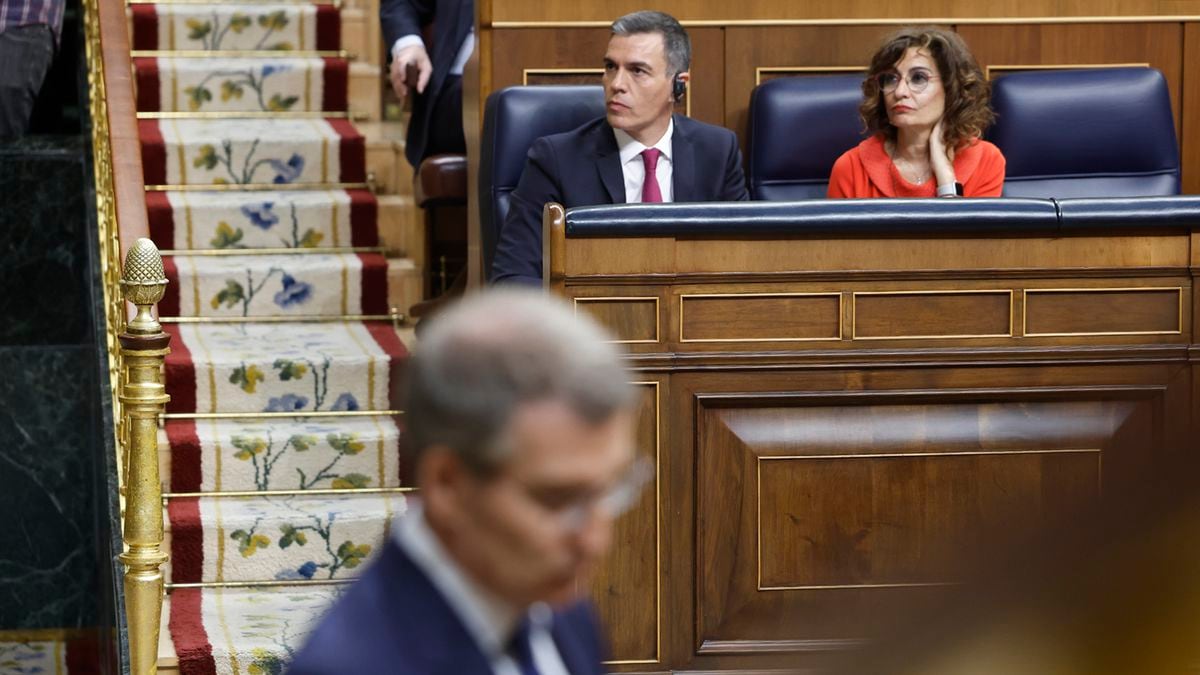An archive image of the Bank of Spain.INMA FLORES
A great economic disturbance without its corresponding financial crisis is like a Hamlet without a skull.
Last spring, civilization seemed to have come to an end once again: the pandemic overwhelmed health systems, forced a confinement worthy of six or seven centuries ago and gave way to an economic crisis that has left large countries with a black eye, and Spain with an eye and a half to the virule.
If it has not gone any further, it is because central banks and governments have provided aid of all kinds.
10 years ago it was the banking sector that put the world - and Spain in particular - into a nightmare;
this time the banking sector is not the problem, although it may be: the smoking guns of the financial crisis are one of the great risks.
“Hard times are coming,” the chief executive of La Caixa, Gonzalo Gortázar, summarized a few days ago with disarming sincerity.
How are the banks?
Good, but not so good.
And they will be worse, according to the Bank of Spain, the IMF and almost any analysis house that has come to realize that the financial system is like one of those planes from the beginning of the last century: prone to crashing.
The half dozen experts consulted for this banking chronicle do not hide their fears in this regard.
And one of the most explicit voices is precisely that of the person in charge of the entire shed, Governor Pablo Hernández de Cos.
"We must avoid at all costs that the health crisis that became an economic crisis ends up generating a financial crisis," he warned in a recent speech.
This mutation into a financial crisis would leave many more scars in terms of unemployment, falling GDP, inequality and other economic indicators.
The Bank of Spain estimates that more than half of Spanish companies will end up in losses in the unfortunate 2020. The impact on household income has been devastating.
The radical uncertainty is distilled into a single data: family savings are at maximum, around 30% of disposable income, for what economists call a "precautionary reason": out of fear of what might happen.
That air of a plague of ulcers has already been noted in the income statement of the sector, which has lost 7,500 million so far this year.
And the worst is yet to come: the economic deterioration has been transferred moderately, for the moment, to doubtful loans, but the supervisor estimates a strong rebound in non-performing loans from 2021, “even in the most benign scenario”, a vaccine that work.
The IMF has a similar opinion.
The Monetary Fund warns "of the danger that the recession will metamorphose into financial stress, with even greater economic and social costs."
And he closes his latest report on Spain with a dark conclusion: "Some banks could have solvency problems if the crisis deepens."
That is the great risk: specific solvency problems that direct the markets' attention to Spain and impose a narrative in the style of
The Emperor's New Costume
.
The banking system was choked on by the real estate bubble last crisis: since then it has taken care of its capital buffers, has undertaken defensive mergers and cost reduction plans (with the dismissal of some 20,000 employees in the midst of the crisis) and has improved, in short, its ability to absorb losses.
The president of the AEB employer, José María Roldán, highlights "the enormous speed of reaction of the entities to the events, with provisions, restructuring plans and up to three mergers in progress."
In that suit, however, some seams are visible.
One: Spanish banks fare badly in top-quality capital comparisons with the rest of the eurozone.
Two: in the most negative scenarios of the ECB stress tests, six capital points may be missing, and it is not easy to get that money now.
Three: the sector has an endemic profitability problem, due to low interest rates and excess capacity.
And four: Spain's fiscal muscle is scarce, and if a mess comes, the Government has less margin than other capitals to spend.
"I would not be surprised by a financial crisis derived from business delinquency, especially when the sector has recently reduced its provisions after having reinforced them at the beginning of the year", summarizes Professor Antonio Torrero.
Xavier Vives, from IESE, argues that banks "are going to suffer depending on how long the crisis lasts, and things are not looking good."
"The level of defaulters is going to go up: the Executive has lengthened the repayment terms of the ICO lines, but there is a latent problem, of zombie companies that are going to close when those aid expire.
The good news is that banks have improved their defenses.
The bad thing is that when the aid is withdrawn, some financial institution can turn out to be very badly portrayed, ”adds Vives.
Vicente Cuñat, from the London School of Economics, points out that it will not really be known how the banks are doing "until it is clear which companies are not going to survive without assisted breathing."
"There may be specific problems of solvency when the business fabric begins to die that only remains alive with public crutches, and in the last crisis we learned that a problem in one entity can end up causing a mess in the entire sector", closes Joaquín Maudos , of the IVIE.
In that case, Hernández de Cos is clear: "It would be necessary to adopt additional measures."
The banks swallowed more than 65,000 million in public aid the last crisis;
of that money the State considers 42,000 million lost.
Another bailout, even a one-off one, would cause a serious public opinion problem: it may be better to approve more aid now to sustain rents, jobs and companies than to have to inject public money into some entity if they are badly given.
"In adverse scenarios, more will have to be done"
"The Government has done what it should, but late, little and badly", laments the economist Juan Ignacio Crespo;
"We already have a double recession on us and it is preferable to spend more to support jobs and companies."
The Bank of Spain has clearly launched that message, but both the Economy and the Treasury opt for a somewhat more orthodox vision.
"In more adverse scenarios, more will have to be done," said Pablo Hernández de Cos a few days ago.
The governor believes that if the lean cows arrive, the solution can only be European: a bad continental bank and a deposit guarantee fund that completes the European banking union.
The problem is that Berlin completely refuses to move in those two directions because it fears it will end up paying for the banking holes in some southern country.
The doubts of the markets go beyond Spain: Italy has had serious business default problems for two decades;
Portugal has been the least generous country with aid and its banks could have a hard time;
the increase in corporate debt in France is vertiginous, and Germany, despite the fact that it has been more generous than any other country with guarantees and even injections of public money into its companies, “has one of the worst banking systems in the world , but the strongest sovereign, and that is a shield for the fiercest crisis ”, according to industry sources.








/cloudfront-eu-central-1.images.arcpublishing.com/prisa/GX6T7JPQYZMTYR575K7UVIU6V4.jpg)
